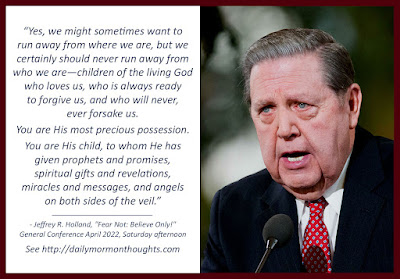"We, of all people, should be 'sing[ing] the song of redeeming love' (Alma 5:26), but that takes discipline—'discipleship,' if you will—the kind that guards against negative attitudes and destructive habits that would pull us off-key as we try to sing that song of eternal salvation."Even as we stay 'on the sunny side of the street,' we do run into that fellow from time to time who is determined to find something bleak and dismal about everything. You know his motto: 'It is always darkest just before it goes pitch-black.' What a malignant vision, and what a miserable existence! Yes, we might sometimes want to run away from where we are, but we certainly should never run away from who we are—children of the living God who loves us, who is always ready to forgive us, and who will never, ever forsake us. You are His most precious possession. You are His child, to whom He has given prophets and promises, spiritual gifts and revelations, miracles and messages, and angels on both sides of the veil."- Jeffrey R. Holland, "Fear Not: Believe Only!", General Conference April 2022, Saturday afternoonClick here to read or listen to the complete address
Much of Elder Holland's address was directed to youth, but with powerful application to all of us. The challenges of life are often profound and heavy. But remembering who we really are, what our heritage is, the help that is available through the Savior's Atonement—those are all great keys to moving forward successfully in life.
We must never forget that we truly do have a loving Father! And that He has provided so many resources to help us with our challenges, and will continue to love and sustain us. Elder Holland's witness was powerful, and if it helps only one struggling youth, it will certainly have been worthwhile. But I believe it has power to help every one of us.
(Compilation and commentary by David Kenison, Orem, Utah, 2022)




























